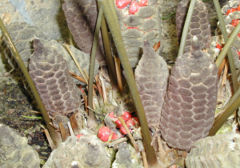| subsp. var.
|
|

|
| Habit:
|
|
[[Category:]]
|
| Height:
|
⇕
|
to
|
| Width:
|
⇔
|
to
|
|
|
cm
|
|
| Height:
|
⇕
|
cm to The wikipage input value is empty (e.g. <code>SomeProperty::, [[]]</code>) and therefore it cannot be used as a name or as part of a query condition.
|
| Width:
|
⇔
|
The wikipage input value is empty (e.g. <code>SomeProperty::, [[]]</code>) and therefore it cannot be used as a name or as part of a query condition. to The wikipage input value is empty (e.g. <code>SomeProperty::, [[]]</code>) and therefore it cannot be used as a name or as part of a query condition.
|
| Lifespan:
|
⌛
|
|
| Origin:
|
✈
|
|
| Poisonous:
|
☠
|
|
| Bloom:
|
❀
|
|
|
| Exposure:
|
☼
|
|
| Water:
|
◍
|
|
| Features:
|
✓
|
|
| Hidden fields, interally pass variables to right place
|
|
|
| Minimum Temp:
|
☃
|
°F
|
| USDA Zones:
|
|
to
|
| Sunset Zones:
|
|
|
| Flower features:
|
❀
|
|
|
|
|
| Standard Cyclopedia of Horticulture
|
|
Zamia pumila, Linn. Differs, according to Webber, in having shorter and broader lfts. which are less twisted and not so erect and rigid, and in its shorter and non-umbonate cones with seed-bearing scales thinner and more flattened at outer end.—Abundant in Cent. Fla., ranging from 28° 30' north for 1° of latitude, in dense moist woods.
The above text is from the Standard Cyclopedia of Horticulture. It may be out of date, but still contains valuable and interesting information which can be incorporated into the remainder of the article. Click on "Collapse" in the header to hide this text.
|
Zamia pumila {{{latin_name}}}
|
Guayiga
|

|
| Habit:
|
|
palm-like
|
| Height:
|
⇕
|
1.5m (5ft)
|
| Width:
|
⇔
|
1.8m (6ft)
|
| Lifespan:
|
⌛
|
perennial
|
| Origin:
|
✈
|
Caribbean islands
|
| Poisonous:
|
☠
|
|
|
| Exposure:
|
☼
|
|
| Water:
|
◍
|
|
| Features:
|
✓
|
|
| Hardiness:
|
☃
|
|
| Bloom:
|
❀
|
|
| USDA Zones:
|
|
10-12
|
| Sunset Zones:
|
|
|
|
| [[{{{domain}}}]] >
|
[[{{{superregnum}}}]] >
|
Plantae >
|
[[{{{subregnum}}}]] >
|
[[{{{superdivisio}}}]] >
|
[[{{{superphylum}}}]] >
|
Cycadophyta >
|
[[{{{phylum}}}]] >
|
[[{{{subdivisio}}}]] >
|
[[{{{subphylum}}}]] >
|
[[{{{infraphylum}}}]] >
|
[[{{{microphylum}}}]] >
|
[[{{{nanophylum}}}]] >
|
[[{{{superclassis}}}]] >
|
Cycadopsida >
|
[[{{{subclassis}}}]] >
|
[[{{{infraclassis}}}]] >
|
[[{{{superordo}}}]] >
|
Cycadales >
|
[[{{{subordo}}}]] >
|
[[{{{infraordo}}}]] >
|
[[{{{superfamilia}}}]] >
|
Zamiaceae >
|
[[{{{subfamilia}}}]] >
|
[[{{{supertribus}}}]] >
|
[[{{{tribus}}}]] >
|
[[{{{subtribus}}}]] >
|
Zamia
|
{{{subgenus}}}
|
{{{sectio}}}
|
{{{series}}}
|
pumila
|
{{{subspecies}}}
|
var. {{{cultivar}}}
|
|
Underground stems are short and have many branches. From these underground stems, 4-12 erect leaves (dark green) emerge on smooth stalks. Cones are red to red-brown.
- More information about this species can be found on the genus page.
Cultivation
| calendar?
|
| January:
|
|
| February:
|
|
| March:
|
|
| April:
|
|
| May:
|
|
| June:
|
|
| July:
|
|
| August:
|
|
| September:
|
|
| October:
|
|
| November:
|
|
| December:
|
|
| Notes:
|
- Do you have cultivation info on this plant? Edit this section!
Propagation
- Do you have propagation info on this plant? Edit this section!
Pests and diseases
- Do you have pest and disease info on this plant? Edit this section!
Varieties
Gallery
If you have a photo of this plant, please upload it! Plus, there may be other photos available for you to add.
References
- Flora: The Gardener's Bible, by Sean Hogan. Global Book Publishing, 2003. ISBN 0881925381
External links


